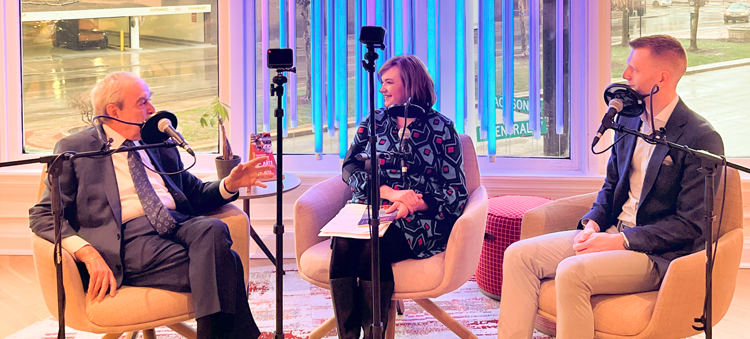posted by Alecia Kintner ON
May 09, 2023
 (L to R) Robert Porco, Alecia Kintner and Matthew Swanson on ArtsWrap with Alecia
(L to R) Robert Porco, Alecia Kintner and Matthew Swanson on ArtsWrap with Alecia
Hear the full discussion with Robert Porco and Matthew Swanson on episode eight of ArtsWrap with Alecia, available wherever you get your podcasts.
In a fragmented world, singing together seems to have the power to unite and transform. Nearly three in four singers say choral singing helps them feel less alone. Compared with members of the general public, they're also far less likely to report
isolation or depression, according to Chorus America. The May Festival Chorus, one of the first arts organizations in Cincinnati and the oldest choral festival in the Western Hemisphere, has been uniting different communities for 150 years.
"It's inspiring to see people who may not get along in a very divisive world [become] friends here," says May Festival Director of Choruses Robert Porco. "They are from entirely different backgrounds, religions, politics and ages, and they all forget
about that when we rehearse, simply for the joy of singing."
Over its history, the May Festival has brought together over 200 choirs, helping to create the city's moniker, "The City that Sings." That mission continues today. "[This year] we wanted to celebrate...the historical roots of the May Festival where lots
of different choruses came together. In the first May Festival in 1873, they came from as far as six states away," says Matthew Swanson, May Festival Associate Director of Choruses. "We chose...community choruses, ones with a social justice mission,
choruses from schools, children's choruses...it was a broad array."
From the beginning, commissioning and performing new works reflecting Cincinnati's changing community has been at the forefront of the May Festival's mission. The Chorus gave Bach's "Magnificat" its American premiere in 1875 and in 1937, it premiered
the work of African American composer Robert Nathanial Dett's "The Ordering of Moses," an inclusive decision at a time before "inclusivity" was discussed, let alone valued.
This commitment to platforming underrepresented composers has never been stronger than it is today. "The Ordering of Moses" returns to the festival in 2023. And at a showcase in February, the May Festival commissioned 25 new works by young composers who
are female, non-binary or gender non-conforming. The performances were free and open to the public, not only creating an environment for musical experimentation, but for social transformation and dialogue.
The May Festival's storied history begins anew this May as it has for 150 years. Once again, the Festival presents a powerful picture of a diverse community, united through the joy singing brings.